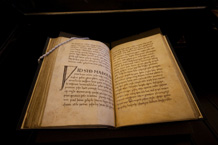The Exeter Book
Da Wikipedia, l'enciclopedia libera.
| The Exeter Book manoscritto | |
|---|---|
 | |
| Opera | Raccolta di componimenti poetici |
| Epoca | 960-980 |
| Lingua | lingua inglese antica |
| Provenienza | Inghilterra occidentale |
| Ubicazione | Cattedrale di Exeter, Devon |
The Exeter Book, o Codice Exeter, è un manoscritto, conservato nella biblioteca della cattedrale di Exeter, nel Devon.
Insieme ai manoscritti Junius XI, Libro di Vercelli e Cotton Vitellius rappresenta uno dei più antichi documenti della produzione poetica in anglosassone.
L’opera conta circa 8.000 versi e 131 fogli originali, dei quali i primi otto sono andati perduti, mentre i restanti sono stati in parte danneggiati.
Storia
[modifica | modifica wikitesto]The Exeter Book è comunemente ritenuto prodotto di una rinascita dei benedettini, collocata approssimativamente tra il 960 e il 990. Durante questo periodo, grazie all’intervento di Dunstano vescovo di Canterbury, l’ordine monastico venne restaurato, riacquistando l’importanza persa durante i secoli precedenti. In seguito all’influenza di Æthelwold, vescovo di Winchester, i nuovi monasteri intrapresero con più fervore l’attività letteraria[1].
Le prime notizie di The Exeter Book risalgono al 1072, anno della morte di Leofric, vescovo di Exeter[1]. Nel suo testamento, lo donò al monastero locale, descrivendolo come mycel Englisc boc be gehwylcum Þingum on leođwisan geworth (un grande libro inglese di opere poetiche)[2].
Contenuti
[modifica | modifica wikitesto]Elegie
[modifica | modifica wikitesto]The Exeter Book contiene otto elegie: The Wanderer (fol. 76b - fol. 78a); The Seafarer (fol. 81b - fol. 83a); The Rhyming Poem fol. 94a - fol. 95b); Deor (fol. 100a - fol. 100b), Wulf and Eadwacer (fol. 100b - fol. 101a); The Wife's Lament (fol. 115a - fol. 115b); The Husband's Message (fol. 123a - 123b); and The Ruin (fol. 123b - fol. 124b). Questi componimenti sono accomunati dalla trattazione di temi legati alla solitudine, al dolore e al trascorrere del tempo[2].
Indovinelli
[modifica | modifica wikitesto]The Exeter Book comprende una raccolta di oltre novanta indovinelli, i cui argomenti spaziano dalla religione a temi della quotidianità.
Note
[modifica | modifica wikitesto]- ^ a b Max Förster, The Donations of Leofric to Exeter, in Chambers, Forster and Flower (a cura di), The Exeter Book of Old English Poetry, 1933.
- ^ a b (EN) Exeter Book | Old English literature, su Encyclopedia Britannica. URL consultato il 22 giugno 2021.
Altri progetti
[modifica | modifica wikitesto] Wikimedia Commons contiene immagini o altri file su The Exeter Book
Wikimedia Commons contiene immagini o altri file su The Exeter Book
Collegamenti esterni
[modifica | modifica wikitesto]- (EN) Exeter Book, su Enciclopedia Britannica, Encyclopædia Britannica, Inc.
- (FR) Bibliografia su The Exeter Book, su Les Archives de littérature du Moyen Âge.
| Controllo di autorità | VIAF (EN) 207977231 · LCCN (EN) n50079632 · GND (DE) 4121231-9 · BNE (ES) XX3620835 (data) · BNF (FR) cb12079832w (data) · J9U (EN, HE) 987007260941205171 |
|---|
Text is available under the CC BY-SA 4.0 license; additional terms may apply.
Images, videos and audio are available under their respective licenses.
